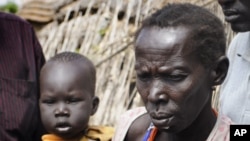Inter-tribal fighting in South Sudan's Jonglei state is testing the government's ability to maintain security, while church-led peace efforts have stalled, raising the possibility of more violence.
Long before the birth of South Sudan, the tribes of Jonglei state have waged battles. For hundreds of years, the men of the Lou Nuer and Murle tribes have launched raids to steal each other's cattle, perpetuating a battle of retaliation and revenge.
But in recent times, the pitch of the fighting has grown more extreme.
Amanda Hsiao, field researcher for the Enough Project, based in South Sudan, said the violence has taken on a new dimension.
“The latest attacks in December saw 6,000 to numbers as high as 12,000 youth organized, highly sophisticated, well-armed, moving down to the Murle areas," Hsiao said. "This is something new and this is a very serious threat to the government's authority.”
The introduction of heavy weapons, which made their way into the hands of Jonglei militias during Sudan's civil war, has raised the casualty and death toll from recent cattle raids into the thousands.
Past efforts at disarmament have only complicated matters, said Hsiao.
“These communities are holding on to their guns because that is their means of defense. So in order for them to be convinced of letting go of their only form of defense and in order for them not to be vulnerable after a disarmament campaign the government has to be able to provide security afterward.”
The other crucial element to securing the peace in Jonglei is bringing the warring factions together for negotiations.
That job has fallen on the Sudan Council of Churches (SCC) which, with the government's support, began mediation efforts following an attack by the Murle against the Lou Nuer in August of last year. The SCC had been training members of each tribe in the art of negotiation so that they would be prepared for a join conference. However, the two sides could not agree on a venue. The talks finally fell apart with the Lou Nuer attack in December.
Bu the council is working on a new plan, said Reverend Mark Akec, the acting general secretary of the SCC.
“We will continue to carry out reconciliation among the communities because that is the role of the church," said Akec. "Although they fight themselves, we are still telling them please live as brothers, be peacemakers.”
Akec added the new strategy involves short and long-term solutions, including establishing pastors and other watchmen in Jonglei to gather information and to serve as an early warning system for future attacks. And he said there are plans to provide more work opportunities for the youth, to incorporate women in the community in the peace process and to empower local church leaders.
But asked when the council expects the actual peace talks between the different tribes to resume, Akec said they are waiting for the funding.
“Now we are still working on our plans, to raise funding and all those things to enable us to do the work. Because if we are not getting any funding from the international community and our partners, NGO's, we can not do anything. So we are working now on a plan then we will send it out to the partners, so we are waiting for their response and as soon as we get their response we will start the work," said Akec.
While the council is optimistic that peace talks will work, renewed violence may be on its way.
Last week, the Lou Nuer militia, which calls itself the White Army, announced plans to surround Murle communities, ostensibly to prevent them from launching any attacks of their own.
Humanitarian agencies have been rushing food and aid to Jonglei in the past few weeks to assist some 120,000 people affected by the violence.













